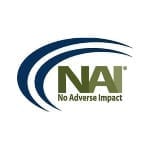No Adverse Impact

Flood damage is on the rise. Current measures to reduce or eliminate flood damage, while a good start, aren’t doing enough. A new approach is needed. Application of the No Adverse Impact Floodplain Management philosophy can fill this need. NAI is a philosophy that looks at the impacts of land use decisions, identifies adverse impacts and mitigates them through a variety of actions. NAI involves more than local floodplain managers — planners, public works officials, zoning officials, development officials, regulatory (review) agencies, stormwater professionals, wetland managers, environmental engineers and environmentalists, emergency responders, disaster preparedness coordinators, hazard mitigation specialists, design professionals and design engineers, architects, landscape professionals, local officials, governing bodies, politicians and the public at large – the “whole community” – all have a role. Through NAI, flood losses can be reduced, property can be protected and lives can be saved!
No Adverse Impact Committee Co-Chairs


The NAI Committee is seeking to develop applications of the philosophy for existing community activities. This includes an array of implementation tools that fall within seven building blocks from the NAI Toolkit:
A considerable amount of consideration is also given to legal issues – community liability and property rights – surrounding floodplain management, especially at the local level. While nothing can prevent all legal challenges, following the NAI approach can help to:
1) reduce the number of lawsuits filed against local governments, and
2) greatly increase the chances that local governments will win legal challenges to their floodplain management practices.
Please contact us for details on how you might join us in changing the nation’s approach to flood loss reduction.
